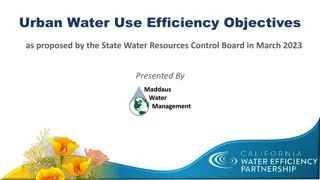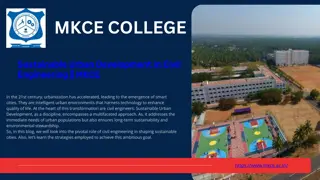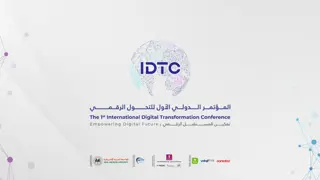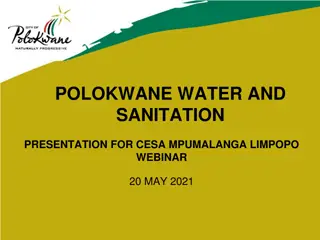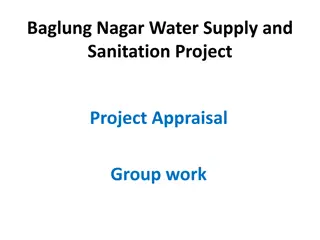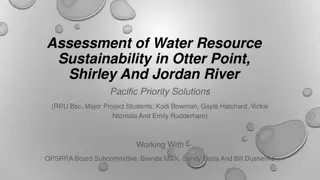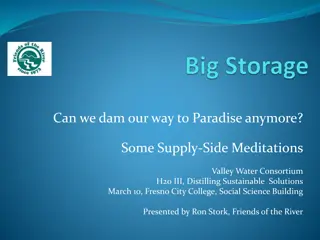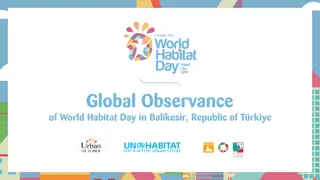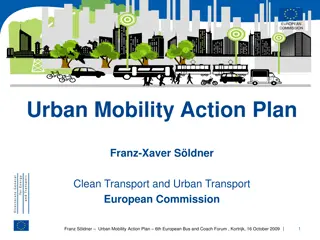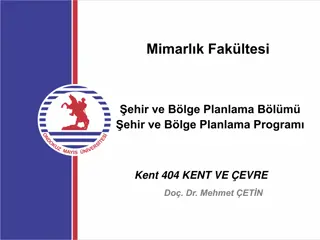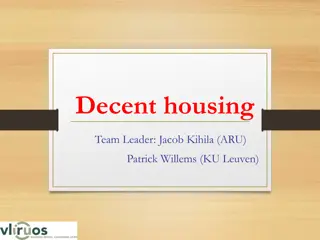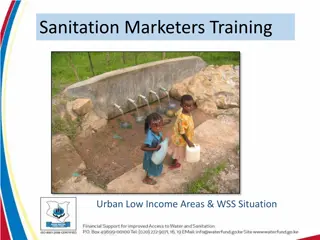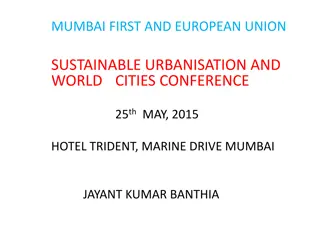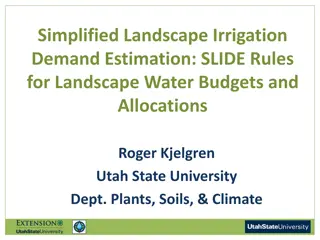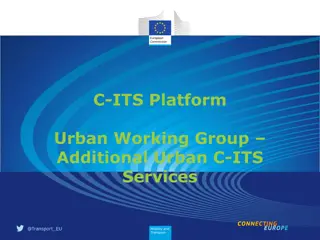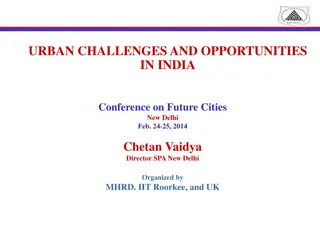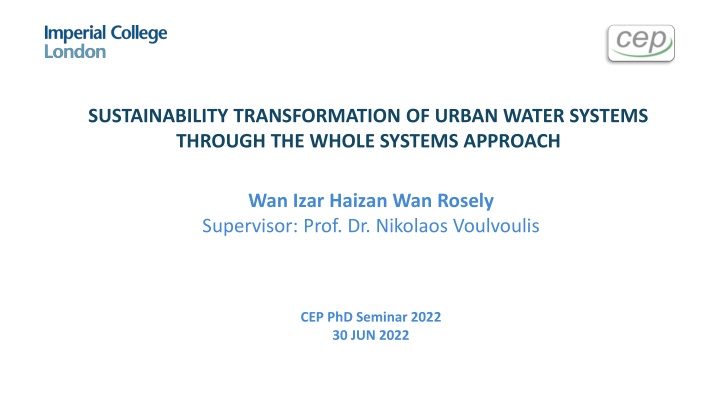
SUSTAINABILITY TRANSFORMATION OF URBAN WATER SYSTEMS
SUSTAINABILITY TRANSFORMATION OF URBAN WATER SYSTEMS THROUGH THE WHOLE SYSTEMS APPROACH. Wan Izar Haizan Wan Rosely Supervisor: Prof. Dr. Nikolaos Voulvoulis. CEP PhD Seminar 2022 30 JUN 2022. OUTLINES. Introduction • What are the problems? • Sustainability Transformation
Download Presentation

Please find below an Image/Link to download the presentation.
The content on the website is provided AS IS for your information and personal use only. It may not be sold, licensed, or shared on other websites without obtaining consent from the author. Download presentation by click this link. If you encounter any issues during the download, it is possible that the publisher has removed the file from their server.
E N D
Presentation Transcript
SUSTAINABILITY TRANSFORMATION OF URBAN WATER SYSTEMS THROUGH THE WHOLE SYSTEMS APPROACH Wan Izar Haizan Wan Rosely Supervisor: Prof. Dr. Nikolaos Voulvoulis CEP PhD Seminar 2022 30 JUN 2022
OUTLINES Introduction What are the problems? Sustainability Transformation A Whole Systems Approach Research Overview Aim/Approach Initial findings Future Works Future works Conclusion
Malaysias Water Sector Transformation 2040 (WST 2040) INTRODUCTION WST 2040 Water security for all Water sector as the next dynamic growth engine NRE 30 sessions (FGD, workshops, public dialogues, meetings) with agencies, NGOs, academicians, businesses (2019-2020) EPU Source: EPU, 2019, 2020 and 2020
Urban water challenges manifest as urban challenges INTRODUCTION Source: Paultan.org cities are complex systems, not designed to be water-friendly gather large amounts of humans in a small place throw off nature s built-in balances determine by economic priorities, social and environmental values and ecological understanding Source:wallpapersdsc.net Source:channelsnewsasia.com Source:Paultan.org Source:freemalaysiatoday.com
The main water challenges discussed INTRODUCTION Demand, availability and accessibility Climate change 6 1 Increasing/uncertainty on demand, competing demand, water availability/scarcity, lack access to water services, slums issues, underutilisation of water resources Extreme weather events and climate change impacts, increased vulnerability of water assets/ reduce systems efficiency, GHG emission from water sector Water Pollution Over-exploitation 7 2 Water pollution, drinking water quality, bathing water quality, illnesses due to polluted water, land-use change/ecosystem degradation, adverse impacts of water infrastructureon environment Infrastructure Over-abstraction (lead to depletion, land-subsidence, saltwater intrusion), lack of diversification of water resources and resource recovery initiatives, Stakeholder participation and attitudes Ageing overflow, insufficient/inefficient systems, non-connected dwellings, metering issues, underutilisation of existing infrastructure, high dependency scale/centralized grey infrastructure infrastructure, leakages, combined sewer 8 3 Increasing demand/expectation from the public, lack of stakeholder participation/ ownership, low appreciation/ poor attitude towards water on large Technology innovation/ research Governance/regulation 9 4 Lack /technology ageing replace/retrofitold infrastructure appropriate/efficient innovation, workforce, technology skilled/competent technical research workers, Governance resiliency, transboundary water issues, changes/more stringent regulation/healthstandards issues, systems/services inefficiency/ difficulties to Finance Emerging Concerns 10 5 Inadequate financing sources/investment, unsustainable financial situation of operators, incompatible water value/pricings/low tariffs,increasing costs, poverty Effects of fragility, conflict, violence on water systems
Sustainability Transformation and A Whole Systems Approach INTRODUCTION SUSTAINABILITY TRANSFORMATION of URBAN WATER SYSTEMS through THE WHOLE SYSTEMS APPROACH Complexities Methodologies Root causes Leverage points Transdisciplinary Inclusive participation Social learning/empowering Increase buy-ins/reduce conflicts Availability and security of water and environment in urban areas today and in the future
Applying the whole systems approach to achieve sustainable urban water systems RESEARCH AIM
Urban water systems from the natural water cycle perspective INITIAL FINDINGS Atmosphere Rainwater Treated wastewater Rainwater Wider catchment area Stormwater Municipal wastewater treatment plant Stormwater Combined sewer Treated wastewater in-silo, fragmented management, lead to complex/wicked problems, unintended consequences integrated management approach introduced Stormwater & other discharges Treated wastewater Storm drains Rainwater Freshwater Industrial wastewater treatment facility treatment facility Industrial wastewater Wastewater Untreated stormwater Residential Commercial/ Government Industrial Freshwater Drinking water Water bodies Stormwater runoff Water supply (treatment & distribution) Wastewater (collection & treatment) Drinking water treatment plant Freshwater Dam/reservoir Rivers/ lakes Freshwater Freshwater Freshwater Freshwater Drinking water wells Freshwater Groundwater aquifers Freshwater
Existing systems research in addressing urban water challenges INITIAL FINDINGS Aims Improve understanding of systems complexity-descriptive Enhance methodological approach applied in researching complex systems Improve modelling/scenario planning (including participatory modelling) Social learning tools, enhance stakeholder s buy-ins, resolve conflicts Improve water management (frameworks, concepts, decision-making, assessment) Systems methodology Multi-criteria Decision Analysis (MCDA) System Dynamic Modelling (SDM) Agent Based Modelling (ABM) Driver-Pressure-State-Impact-Response (DPSIR) Social Network Analysis (SNA) Bayesian Belief Network (BBN) Backcasting Soft Systems Methodology (SSM) Socio-Technical Analysis (STA) Critical Systems Heuristics (CSH) Vanguard Method (VM) Gaps Research Processes 1. Problem scoping 2. Boundary setting 3. Systems mapping 4. Computer modelling 5. Scenario analysis 6. Recommendation Lack empirical evidences in the practical application Solutions focus more on infrastructure than people Research overemphasis on systems engineeringand computational efforts Systems interventions to address water challenges have not been truly systemic
Urban water systems from the systems perspective INITIAL FINDINGS
Potential root causes and enablers to sustainability INITIAL FINDINGS Social practices the value of water Technologies Societal norms UWS institutions and political choices people-nature disconnection Regulations Business models
Conceptual framework for systemic transformation of the urban water system INITIAL FINDINGS 1. Systems understanding 2. Problem conceptualisation 3. Pathways 4. Implementation 5. Monitoring and evaluation Interventions to breach the gap, Enablers, Leverage points Interconnected changes to: Ensuring progress Problem as the gap between: How things work Participatory process Systems mapping, Stakeholder Analysis, SNA, CSH DPSIR, Gap analysis, SSM, Back casting Back casting, SSM, MCDA, Systems Modelling (SDM, ABM, SNA, BBN) SSM, MCDA DPSIR Potential systems tools
Investigating leverage point FUTURE WORKS
Conclusion CONCLUSION Systemic transformation towards sustainability of urban water systems requires a shift of paradigm to rethink challenges and redesign solutions, and to determine appropriate participatory tools to facilitate system change through leverage points
REFERENCES Abson, D. J., Fischer, J., Leventon, J., Newig, J., Schomerus, T., Vilsmaier, U., von Wehrden, H., Abernethy, P., Ives, C. D., Jager, N. W., & Lang, D. J. (2017). Leverage points for sustainability transformation. Ambio, 46(1), 30 39. https://doi.org/10.1007/s13280-016-0800-y Dunn, G., Brown, R. R., Bos, J. J., & Bakker, K. (2017). Standing on the shoulders of giants: Understanding changes in urban water practice through the lens of complexity science. Urban Water Journal, 14(7), 758 767. https://doi.org/10.1080/1573062X.2016.1241284 Economic Planning Unit of The Malaysian Government. (2021). Executive Summary of The Twelfth Malaysia Plan 2021-2025. Economic Planning Unit Malaysia, 2021, 16. Franco-Torres, M., Rogers, B. C., & Harder, R. (2020). Articulating the new urban water paradigm. Critical Reviews in Environmental Science and Technology, 1 48. https://doi.org/10.1080/10643389.2020.1803686 Voulvoulis, N., Giakoumis, T., Hunt, C., Kioupi, V., Petrou, N., Souliotis, I., Vaghela, C., & Rosely, W. (2022). Systems thinking as a paradigm shift for sustainability transformation. Global Environmental Change, 75(August 2021), 102544. https://doi.org/10.1016/j.gloenvcha.2022.102544
REFERENCES Thank you w.binti-wan-rosely20@imperial.ac.uk




